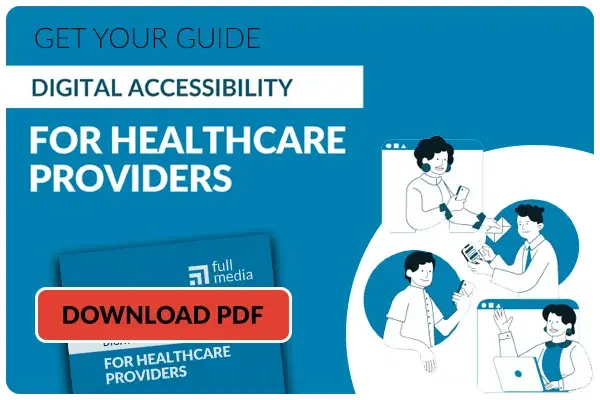16 Numbers That Will Make You Rethink Your Healthcare Marketing Strategy
Healthcare organizations, large or small, operate in a very competitive environment where driving new patients and influencing market share is critical. Here at Full Media, we are asked to build strategies all the time that maximize limited budgets to drive more value for our clients. With that in mind, we wanted to share some of the key statistics we consider about online patient behavior and trends in healthcare marketing that may help you shift your marketing strategy toward greater success.
1. Google owns 88% of the search share in the United States. (source: statcounter)
2. Mobile makes up 49% of all searches in the United States. (source: statcounter)
At this point, the power of mobile is so important that responsive design is just a start. Have you navigated your website on a mobile device? Is it easy to use and to make an appointment? When you search in Google for your physicians, your practice or your services, is your practice easy to find in Google Maps? Is your phone number listed and easy to find in the search engine?
Finally, when you run ads online or with online news sites or magazines, are you including mobile-specific creative?
Patients make the majority of their decisions on a mobile device, and large healthcare providers are shifting their strategy to focus on mobile-first. It’s time for all healthcare marketers to consider mobile a top priority not just when they redesign a website, but throughout their entire marketing strategy.
3. More than 50% of all searches are zero click. This means that many searchers found what they were looking for in the search results themselves and did not need to visit a website. (source: Rand Fishkin / SparkToro)
The increase in zero-click searches highlights the importance of considering your off-site marketing strategy. Optimizing your google maps listing and other local listings is essential. Consider optimizing your content to show up in Google’s knowledge graph and the “people also ask” section in Google Search.
Dr. Google is in. Are you?
4. Seven percent of all Google Searches are health related. That equals 1 billion searches every day. (source: Google)
5. Eight in ten online health inquires start with a search engine (source: Pew Research)
Search is, quite simply, where the healthcare journey starts for the majority of patients. Optimizing your website for search and paid search advertising can be two of the most effective tools in your marketing toolkit.
6. 55% of searchers looked for information about a specific disease or medical problem. (source: Pew Research)
7. 43% of searches looked for information about a certain medical treatment or procedure. (source: Pew Research)
Patients do use search to look up WebMD and Mayo Clinic-type content to self-diagnose, but they also use search engines to look for treatments, providers and locations to receive care. It’s important to consider the complete scope of searches that may be related to your services and develop a content strategy for your website that addresses a wide array of topics.
8. 63% of patients will choose one provider over another due to strong online presence. (source: doctor.com)
Your website, your content and your online reviews matter. They influence the way that patients look at the professionalism and expertise of your practice. It’s your new front door.
For the people in the back, online reviews matter!
9. 90% of patients use online reviews to evaluate physicians. (source: Software Advice)
10. 81% of patients will read reviews about a provider even after they’ve been referred. (source: doctor.com)
11. 79% of consumers trust an online review as much as a personal recommendation from friends or family. (source: BrightLocal)
Need we say more about the power of great online reviews? Ensuring that you have a strategy to gain more reviews and address poor reviews is critical for the success of your marketing plan.
The path to an appointment starts online.
12. 4 in 5 patient encounters with a health system start with a mobile-phone search. (source: Google)
13. 44% of patients who research hospitals on a mobile device scheduled an appointment. (source: Google)
14. 88% of healthcare appointments are scheduled by phone. (source: Sequence)
The Internet is how patients, both new and returning, schedule appointments with your practice. Gearing your marketing strategy toward digital can help drive far more leads at a lower price point than traditional media, like print, direct mail, billboards and tv.
But having a tracking strategy is key to ensuring that you can see that success! While many practices track what marketing mediums are leading to a contact form submission, far fewer invest in call tracking.
By using a HIPAA-compliant call tracking system, you can see what marketing mediums are generating calls to your practice. This is critical because almost 90% of all appointments are scheduled by phone. While EHRs and online patient scheduling are a huge trend, the truth is that more patients still feel comfortable just giving you a call.
Learn more about HIPAA-compliant call tracking or Full Media's status as a fully HIPAA-compliant agency.
Digital is cost-effective, but that doesn’t mean it’s cheap.
Budget is always the big question. While healthcare organizations still spend the lion's share on traditional media, the investment in digital is growing. We hear our clients ask all the time, "what are our competitors doing?" So often it's difficult to tell. But here are some benchmarks from the Society for Health Care Strategy and Market Development on budgets for outsourced digital services:
15. Hospital/health system median annual budgets for outsourced digital services:
- Advertising/ad agency: $200,000
- Digital/digital agency: $86,000
- Internet strategy/website design, development or content: $60,00
- SEO and search engine marketing: $40,000
- Social media: $23,000
16. Hospital/health system average annual budgets for outsourced digital services:
- Advertising/ad agency: $627,625
- Digital/digital agency: $890,779
- Internet strategy/website design, development or content: $114,084
- SEO and search engine marketing: $72,517
- Social media: $94,792
While you may and likely should expect to pay less if you are a small physician practice or single-specialty physician group, digital marketing is a large investment for many healthcare providers.
The fact that it’s cost effective doesn’t mean you should seek the lowest bid out there. The key is ensuring that you find a vendor who provides in-depth reporting and can help you demonstrate ROI on your investment. Digital can yield a far superior ROI to traditional media, not to mention it’s much more measurable than TV or a billboard.
Find a vendor who won’t just send a standard report with clicks and impressions. This data is valuable, but ultimately your digital agency should tie your marketing spend back to actual patient leads. Digital marketing should not be seen as cheap – it should be valued for its ability to drive a higher ROI.
At Full Media, we consider analytics and reporting a unique specialty. We are able to develop fully custom reports and help unite the analytics strategy across your digital and offline marketing mediums so you can truly compare apples to apples and understand the value of each of your marketing expenditures. View a case study where reporting and analytics helped us drive a superior ROI for one of our clients.
As a healthcare digital marketing agency, Full Media provides search engine optimization, search engine marketing, custom reporting and analytics, website development and more. If you are ready to take your digital investment to the next level, contact us today!




